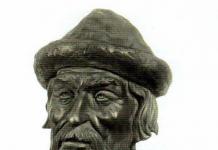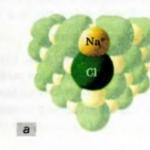The most important dates in Russian history,
things to remember when taking the Unified State Exam
- VI century n. e., from 530 - Great Migration of the Slavs. The first mention of the Ros/Russians
- 860 - the first Russian campaign against Constantinople
- 862 - The year to which the “Tale of Bygone Years” refers to the “calling of the Norman king” Rurik.
- 911 - The campaign of the Kyiv prince Oleg to Constantinople and the agreement with Byzantium.
- 941 - Campaign of the Kyiv prince Igor to Constantinople.
- 944 - Treaty of Igor with Byzantium.
- 945 - 946 - Submission of the Drevlyans to Kyiv
- 957 - Princess Olga's trip to Constantinople
- 964–966 - Svyatoslav’s campaigns against the Kama Bulgarians, Khazars, Yasses and Kasogs
- 967–971 - War of Prince Svyatoslav with Byzantium
- 988–990 - The beginning of the baptism of Rus'
- 1037 - Foundation of the Church of Sophia in Kyiv
- 1043 - Prince Vladimir's campaign against Byzantium
- 1045–1050 - Construction of the Temple of Sophia in Novgorod
- 1054–1073 - Presumably during this period “Pravda Yaroslavichy” appears
- 1056–1057 - “Ostromir Gospel”
- 1073 - “Izbornik” of Prince Svyatoslav Yaroslavich
- 1097 - First congress of princes in Lyubech
- 1100 - Second congress of princes in Uvetichi (Vitichev)
- 1116 - The Tale of Bygone Years appears in Sylvester's edition
- 1147 - The first chronicle mention of Moscow
- 1158–1160 - Construction of the Assumption Cathedral in Vladimir-on-Klyazma
- 1169 - Capture of Kyiv by the troops of Andrei Bogolyubsky and his allies
- 1170 February 25 - Victory of the Novgorodians over the troops of Andrei Bogolyubsky and his allies
- 1188 - Approximate date of appearance of “The Tale of Igor’s Campaign”
- 1202 - Founding of the Order of the Sword (Livonian Order)
- 1206 - Temujin is proclaimed “Great Khan” of the Mongols and takes the name Genghis Khan
- 1223 May 31 - Battle of Russian princes and Polovtsians on the river. Kalke
- 1224 - Capture of Yuriev (Tartu) by the Germans
- 1237 - Union of the Order of the Sword and the Teutonic Order
- 1237–1238 - Invasion of Khan Batu in North-Eastern Rus'
- 1238 March 4 - Battle of the river. City
- 1240 July 15 - Victory of the Novgorod prince Alexander Yaroslavich over the Swedish knights on the river. Neve
- 1240 December 6 (or November 19) - Capture of Kyiv by the Mongol-Tatars
- 1242 April 5 - “Battle of the Ice” on Lake Peipsi
- 1243 - Formation of the Golden Horde.
- 1262 - Uprising against the Mongol-Tatars in Rostov, Vladimir, Suzdal, Yaroslavl
- 1327 - uprising against the Mongol-Tatars in Tver
- 1367 - Construction of the stone Kremlin in Moscow
- 1378 - The first victory of Russian troops over the Tatars on the river. Vozhe
- 1380 September 8 - Battle of Kulikovo
- 1382 - Campaign to Moscow by Khan Tokhtamysh
- 1385 - Krevo Union of the Grand Duchy of Lithuania with Poland
- 1395 - Defeat of the Golden Horde by Timur (Tamerlane)
- 1410 July 15 - Battle of Grunwald. The raid of German knights by Polish-Lithuanian-Russian troops
- 1469–1472 - Travel of Afanasy Nikitin to India
- 1471 - Ivan III's campaign against Novgorod. Battle on the river Sheloni
- 1480 - “Standing” on the river. Eel. The end of the Tatar-Mongol yoke.
- 1484–1508 - Construction of the Moscow Kremlin. Construction of cathedrals and the Chamber of Facets
- 1507–1508, 1512–1522 - Wars of the Moscow State with the Grand Duchy of Lithuania. Return of Smolensk and Smolensk land
- 1510 - Pskov annexed to Moscow
- 1547 January 16 - Crowning of Ivan IV to the throne
- 1550 - Code of Law of Ivan the Terrible. Creation of the Streltsy army
- 1550 October 3 - Decree on the placement of the “chosen thousand” in the counties adjacent to Moscow
- 1551 - February-May - Hundred-Glavy Cathedral of the Russian Church
- 1552 - Capture of Kazan by Russian troops. Annexation of the Kazan Khanate
- 1556 - Astrakhan annexed to Russia
- 1558–1583 - Livonian War
- 1565–1572 - Oprichnina
- 1569 - Union of Lublin. Formation of the Polish-Lithuanian Commonwealth
- 1582 January 15 - Truce of the Russian state with the Polish-Lithuanian Commonwealth in Zapolsky Yam
- 1589 - Establishment of the patriarchate in Moscow
- 1590–1593 - War of the Russian state with Sweden
- 1591 May - Death of Tsarevich Dmitry in Uglich
- 1595 - Conclusion of the Tyavzin Peace with Sweden
- 1598 January 7 - Death of Tsar Fyodor Ivanovich and the end of the Rurik dynasty
- October 1604 - Intervention of False Dmitry I into the Russian state
- 1605 June - Overthrow of the Godunov dynasty in Moscow. Accession of False Dmitry I
- 1606 - Uprising in Moscow and murder of False Dmitry I
- 1607 - Beginning of the intervention of False Dmitry II
- 1609–1618 - Open Polish-Swedish intervention
- 1611 March-April - Creation of a militia against the invaders
- 1611 September-October - Creation of a militia led by Minin and Pozharsky in Nizhny Novgorod
- 1612 October 26 - Capture of the Moscow Kremlin by the militia of Minin and Pozharsky
- 1613 - February 7–21 - Election of Mikhail Fedorovich Romanov to the kingdom by the Zemsky Sobor
- 1633 - Death of Patriarch Filaret, father of Tsar Mikhail Fedorovich
- 1648 - Uprising in Moscow - “Salt Riot”
- 1649 - “Conciliar Code” of Tsar Alexei Mikhailovich
- 1649–1652 - Erofei Khabarov’s campaigns to the Daurian land along the Amur
- 1652 - Nikon’s consecration as patriarch
- 1653 - Zemsky Sobor in Moscow and the decision to reunite Ukraine with Russia
- 1654 January 8–9 - Pereyaslav Rada. Reunification of Ukraine with Russia
- 1654–1667 - Russia's war with Poland over Ukraine
- 1667 January 30 - Truce of Andrusovo
- 1670–1671 - Peasant war led by S. Razin
- 1676–1681 - Russia’s war with Turkey and Crimea for Right Bank Ukraine
- 1681 January 3 - Truce of Bakhchisarai
- 1682 - Abolition of localism
- 1682 May - Streltsy uprising in Moscow
- 1686 - "Eternal Peace" with Poland
- 1687–1689 - Crimean campaigns, book. V.V. Golitsyna
- 1689 August 27 - Treaty of Nerchinsk with China
- 1689 September - Overthrow of Princess Sophia
- 1695–1696 - Azov campaigns of Peter I
- 1696 January 29 - death of Ivan V. Establishment of autocracy of Peter I
- 1697–1698 - “Great Embassy” of Peter I to Western Europe
- 1698 April-June - Streltsy riot
- 1699 December 20 - Decree on the introduction of a new calendar from January 1, 1700.
- 1700 July 13 - Truce of Constantinople with Turkey
- 1700–1721 - Northern War between Russia and Sweden
- 1700 - Death of Patriarch Adrian. Appointment of Stefan Yavorsky as locum tenens of the patriarchal throne
- 1700 November 19 - defeat of Russian troops near Narva
- 1703 - The first stock exchange in Russia (merchant meeting) in St. Petersburg
- 1703 - Publication of the textbook “Arithmetic” by Magnitsky
- 1707–1708 - Uprising on the Don by K. Bulavin
- 1709 June 27 - Defeat of Swedish troops at Poltava
- 1711 - Prut campaign of Peter I
- 1712 - Decree on the establishment of commercial and industrial companies
- 1714 March 23 - Decree on unified inheritance
- 1714 July 27 - Victory of the Russian fleet over the Swedish at Gangut
- 1721 August 30 - Peace of Nystad between Russia and Sweden
- 1721 October 22 - Acceptance of the imperial title by Peter I
- 1722 January 24 - Table of Ranks
- 1722–1723 - Persian campaign of Peter I
- 1724 January 28 - Decree on the establishment of the Russian Academy of Sciences
- 1725 January 28 - Death of Peter I
- 1726 February 8 - Establishment of the Supreme Privy Council
- 1727 May 6 - death of Catherine I
- 1730 January 19 - Death of Peter II
- 1731 - Cancellation of the decree on unified inheritance
- 1732 January 21 - Treaty of Rasht with Persia
- 1734 - “Treatise on Friendship and Commerce” between Russia and England
- 1735–1739 - Russian-Turkish War
- 1736 - Decree on the “eternal assignment” of artisans to manufactories
- 1740 from November 8 to 9 - Palace coup, overthrow of regent Biron. Announcement of Regent Anna Leopoldovna
- 1741–1743 - The war between Russia and Sweden
- 1741 November 25 - Palace coup, installation of Elizabeth Petrovna on the throne by the guards
- 1743 June 16 - Peace of Abo with Sweden
- 1755 January 12 - Decree on the founding of Moscow University
- 1756 August 30 - Decree on the establishment of the Russian theater in St. Petersburg (F. Volkov’s troupe)
- 1759 August 1 (12) - Victory of Russian troops at Kunnersdorf
- 1760 September 28 - Capture of Berlin by Russian troops
- 1762 February 18 - Manifesto “On the Liberty of the Nobility”
- 1762 July 6 - Assassination of Peter III and accession to the throne of Catherine II
- 1764 - Establishment of the Smolny Institute in St. Petersburg
- 1764 from July 4 to 5 - Attempted coup by V.Ya. Mirovich. The murder of Ivan Antonovich in the Shlisselburg fortress
- 1766 - Annexation of the Aleutian Islands to Russia
- 1769 - First external loan in Amsterdam
- 1770 June 24–26 - Defeat of the Turkish fleet in Chesme Bay
- 1773–1775 - First section of the Polish-Lithuanian Commonwealth
- 1773–1775 - Peasant war led by E.I. Pugacheva
- 1774 July 10 - Peace of Kuchuk-Kainarzhi with Turkey
- 1783 - Annexation of Crimea to Russia 1785 April 21 - Charters granted to the nobility and cities
- 1787–1791 - Russian-Turkish War
- 1788–1790 - Russian-Swedish War 1791 December 29 - Peace of Iasi with Turkey
- 1793 - Second partition of the Polish-Lithuanian Commonwealth
- 1794 - Polish uprising led by T. Kosciuszko and its suppression
- 1795 - Third partition of Poland
- 1796 - Formation of the Little Russian province 1796–1797. - War with Persia
- 1797 - April 5 - “Institution of the Imperial Family”
- 1799 - Italian and Swiss campaigns by A.V. Suvorov
- 1799 - Formation of the United Russian-American Company
- 1801 January 18 - Manifesto on the accession of Georgia to Russia
- 1801 from March 11 to 12 - Palace coup. Assassination of Paul I. Accession to the throne of Alexander I
- 1804–1813 - Russian-Iranian war
- 1805 November 20 - Battle of Austerlitz
- 1806–1812 - Russia's war with Turkey
- 1807 June 25 - Peace of Tilsit
- 1808–1809 - Russian-Swedish war
- 1810 January 1 - Establishment of the State Council
- 1812 - Invasion of Napoleon's Grand Army into Russia. Patriotic War
- 1812 August 26 - Battle of Borodino
- 1813 January 1 - Beginning of the Foreign Campaign of the Russian Army
- 1813 October 16–19 - "Battle of the Nations" at Leipzig
- 1814 March 19 - Allied forces enter Paris
- 1814 September 19 -1815 May 28 - Congress of Vienna
- 1825 December 14 - Decembrist uprising in St. Petersburg
- 1826–1828 - Russian-Iranian war
- 1827 October 20 - Battle of Navarino Bay
- 1828 February 10 - Turkmanchay peace treaty with Iran
- 1828–1829 - Russian-Turkish War
- 1829 September 2 - Treaty of Adrianople with Turkey
- 1835 July 26 - University Charter
- 1837 October 30 - Opening of the St. Petersburg-Tsarskoe Selo railway
- 1839–1843 - Monetary reform of Count E. f. Kankrina
- 1853 - Opening of the “Free Russian Printing House” by A.I. Herzen in London
- 1853 - Kokaid campaign by general. V.A. Perovsky
- 1853–1856 - Crimean War
- 1854 September - 1855 August - Defense of Sevastopol
- 1856 March 18 - Treaty of Paris
- 1860 May 31 - Establishment of the State Bank
- 1861 February 19 - Abolition of serfdom
- 1861 - Establishment of the Council of Ministers
- 1863 June 18 - University Charter
- 1864 November 20 - Decree on judicial reform. "New judicial statutes"
- 1865 - Military judicial reform
- 1874 January 1 - “Charter on military service”
- 1874 spring - The first mass “going to the people” of revolutionary populists
- 1875 April 25 - St. Petersburg Treaty between Russia and Japan (on South Sakhalin and the Kuril Islands)
- 1876–1879 - Second “Land and Freedom”
- 1877–1878 - Russian-Turkish War
- 1879 August - Split of “Land and Freedom” into “Black Redistribution” and “People’s Will”
- 1881 March 1 - Assassination of Alexander II by revolutionary populists
- 1885 January 7–18 - Morozov strike
- 1892 - Russian-French secret military convention
- 1896 - Invention of the radiotelegraph by A.S. Popov
- 1896 May 18 - Khodynka tragedy in Moscow during the coronation of Nicholas II
- 1898 March 1–2 - First Congress of the RSDLP
- 1899 May-July - I Hague Peace Conference
- 1902 - Formation of the Socialist Revolutionary Party (SRs)
- 1904–1905 - Russo-Japanese War
- 1905 January 9 - “Bloody Sunday”. The beginning of the first Russian revolution
- April 1905 - Formation of the Russian Monarchist Party and the “Union of the Russian People”.
- 1905 May 12-June 1 - General strike in Ivanovo-Voskresensk. Formation of the first Council of Workers' Deputies
- 1905 May 14–15 - Battle of Tsushima
- 1905 June 9–11 - Lodz Uprising
- 1905 June 14–24 - Mutiny on the battleship Potemkin
- 1905 August 23 - Treaty of Portsmouth with Japan
- 1905 October 7 - Beginning of the All-Russian political strike
- 1905 October 12–18 - Founding Congress of the Constitutional Democratic Party (Cadets)
- 1905 October 13 - Creation of the St. Petersburg Council of Workers' Deputies
- 1905 October 17 - Manifesto of Nicholas II
- 1905 November - The emergence of the “Union of October 17” (Octobrists)
- 1905 December 9–19 - Moscow armed uprising
- 1906 April 27-July 8 - I State Duma
- 1906 November 9 - Beginning of agrarian reform P.A. Stolypin
- 1907 February 20-June 2 - II State Duma
- 1907 November 1 - 1912 July 9 - III State Duma
- 1908 - Formation of the reactionary “Union of Michael the Archangel”
- 1912 November 15 - 1917 February 25 - IV State Duma
- 1914 July 19 (August 1) - Germany declares war on Russia. Beginning of the First World War
- 1916 May 22-July 31 - Brusilovsky breakthrough
- 1916 December 17 - Murder of Rasputin
- 1917 February 26 - Beginning of the transition of troops to the side of the revolution
- 1917 February 27 - February Revolution. Overthrow of the autocracy in Russia
- 1917, March 3 - Abdication of the leader. book Mikhail Alexandrovich. Declaration of the Provisional Government
- 1917 June 9–24 - I All-Russian Congress of Soviets of Workers' and Soldiers' Deputies
- 1917 August 12–15 - State meeting in Moscow
- 1917 August 25-September 1 - Kornilov rebellion
- 1917 September 14–22 - All-Russian Democratic Conference in Petrograd
- 1917 October 24–25 - Armed Bolshevik coup. Overthrow of the Provisional Government
- 1917 October 25 - Opening of the Second All-Russian Congress of Soviets
- 1917 October 26 - Soviet decrees on peace, on land. "Declaration of the Rights of the Peoples of Russia"
- 1917 November 12 - Elections to the Constituent Assembly
- 1917 December 7 - Decision of the Council of People's Commissars to create the All-Russian Extraordinary Commission for the Fight against Counter-Revolution (VChK)
- 1917 December 14 - Decree of the All-Russian Central Executive Committee on the nationalization of banks
- 1917 December 18 - Independence of Finland
- 1918–1922 - Civil war on the territory of the former Russian Empire
- 1918 January 6 - Dispersal of the Constituent Assembly
- 1918 January 26 - Decree on the transition to a new calendar style from February 1 (14)
- 1918 - March 3 - Conclusion of the Brest-Litovsk Peace
- 1918 May 25 - Beginning of the uprising of the Czechoslovak Corps
- 1918 July 10 - Adoption of the Constitution of the RSFSR
- 1920 January 16 - Lifting of the blockade of Soviet Russia by the Entente
- 1920 - Soviet-Polish War
- 1921 February 28-March 18 - Kronstadt uprising
- 1921 March 8–16 - X Congress of the RCP(b). Decision on the "New Economic Policy"
- 1921 March 18 - Riga Peace Treaty of the RSFSR with Poland
- 1922 April 10-May 19 - Genoa Conference
- 1922 April 16 - Rappal separate treaty of the RSFSR with Germany
- 1922 December 27 - Formation of the USSR
- 1922 December 30 - I Congress of Soviets of the USSR
- 1924 January 31 - Approval of the Constitution of the USSR
- 1928 October - 1932 December - First Five-Year Plan. The beginning of industrialization in the USSR
- 1930 - Beginning of complete collectivization
- 1933–1937 - Second Five Year Plan
- 1934 December 1 - Murder of S.M. Kirov. The deployment of mass terror in the USSR
- 1936 December 5 - Adoption of the Constitution of the USSR
- 1939 August 23 - Soviet-German Non-Aggression Pact
- 1939 September 1 - German attack on Poland. Beginning of World War II
- 1939 September 17 - Entry of Soviet troops into Poland
- 1939 September 28 - Soviet-German Treaty of Friendship and Borders
- 1939 November 30 - 1940 March 12 - Soviet-Finnish War
- 1940 June 28 - Entry of Soviet troops into Bessarabia
- 1940 June-July - Soviet occupation of Latvia, Lithuania and Estonia
- 1941 April 13 - Soviet-Japanese Neutrality Treaty
- 1941 June 22 - Attack of Nazi Germany and its allies on the USSR. Beginning of the Great Patriotic War
- 1945 May 8 - Act of unconditional surrender of Germany. Victory of the USSR in the Great Patriotic War
- 1945 September 2 - Act of Unconditional Surrender of Japan
- 1945 November 20 - 1946 October 1 - Nuremberg trials
- 1946–1950 - Fourth Five-Year Plan. Restoration of the destroyed national economy
- 1948 August - Session of VASKHNIL. Launch of a campaign to combat “Morganism” and “cosmopolitanism”
- 1949 January 5–8 - Creation of CMEA
- 1949 August 29 - First test of an atomic bomb in the USSR
- 1954 June 27 - Launch of the world's first nuclear power plant in Obninsk
- 1955 14m; 1st - Creation of the Warsaw Pact Organization (WTO)
- 1955 July 18–23 - Meeting of the heads of government of the USSR, Great Britain, USA and France in Geneva
- 1956 February 14–25 - XX Congress of the CPSU
- 1956 June 30 - Resolution of the Central Committee of the Communist Party of the Soviet Union “Overcoming the cult of personality and its consequences”
- 1957 July 28-August 11 - VI World Festival of Youth and Students in Moscow
- 1957 October 4 - Launch of the world's first artificial Earth satellite in the USSR
- 1961 April 12 - Flight of Yu.A. Gagarin on the Vostok spacecraft
- 1965 March 18 - Launch of pilot-cosmonaut A.A. Leonov into outer space
- 1965 - Reform of the economic management mechanism in the USSR
- 1966 June 6 - Resolution of the Central Committee of the Communist Party of the Soviet Union and the Council of Ministers of the USSR “On the public conscription of youth for the most important construction projects of the five-year plan”
- 1968 August 21 - Intervention of ATS countries in Czechoslovakia
- 1968 - Open letter from Academician A.D. Sakharov to the Soviet leadership
- 1971, March 30-April 9 - XXIV Congress of the CPSU
- 1972 May 26 - Signing in Moscow of the “Fundamentals of Relations between the USSR and the USA.” The beginning of the policy of "détente"
- 1974 February - Expulsion from the USSR A.I. Solzhenitsyn
- 1975 July 15–21 - Joint Soviet-American experiment under the Soyuz-Apollo program
- 1975 July 30-August 1 - Conference on Security and Cooperation in Europe (Helsinki). Signing of the Final Act by 33 European countries, the USA and Canada
- 1977 October 7 - Adoption of the Constitution of “developed socialism” of the USSR
- 1979 December 24 - Beginning of the Soviet intervention in Afghanistan
- 1980 January - Link A.D. Sakharov to Gorky
- 1980 July 19-August 3 - Olympic Games in Moscow
- 1982 May 24 - Adoption of the Food Program
- 1985 November 19–21 - Meeting of M.S. Gorbachev and US President R. Reagan in Geneva. Restoration of Soviet-American political dialogue
- 1986 April 26 - Accident at the Chernobyl nuclear power plant
- 1987 June-July - The beginning of the policy of “perestroika” in the USSR
- 1988 June 28-July 1 - XIX Conference of the CPSU. The beginning of political reform in the USSR
- 1989 May 25-June 9. - I Congress of People's Deputies of the USSR, elected on the basis of changes to the Constitution of the USSR
- 1990 March 11 - Adoption of the act of independence of Lithuania.
- 1990 March 12–15 - III Extraordinary Congress of People's Deputies of the USSR
- 1990 May 1-June 12 - Congress of People's Deputies of the RSFSR. Declaration of State Sovereignty of Russia
- 1991 March 17 - Referendum on preserving the USSR and introducing the post of President of the RSFSR
- 1991 June 12 - Russian presidential elections
- 1991 July 1 - Dissolution of the Warsaw Pact Organization in Prague
- 1991 August 19–21 - Attempted coup in the USSR (Case of the State Emergency Committee)
- September 1991 - Troops entered Vilnius. Attempted coup in Lithuania
- 1991 December 8 - Signing in Minsk by the leaders of Russia, Ukraine and Belarus of the agreement on the “Commonwealth of Independent States” and the dissolution of the USSR
- 1992 January 2 - Liberalization of prices in Russia
- 1992 February 1 - Declaration of Russia and the United States on the end of the Cold War
- 1992 March 13 - Initialing of the Federal Treaty of Republics within the Russian Federation
- 1993 March - VIII and IX Congresses of People's Deputies of the Russian Federation
- 1993 April 25 - All-Russian referendum on confidence in the policies of the President of Russia
- June 1993 - Work of the constitutional meeting to prepare the draft Constitution of Russia
- 1993 September 21 - Decree of B.N. Yeltsin “On stage-by-stage constitutional reform” and the dissolution of the Supreme Council of the Russian Federation
- 1993 October 3–4 - Demonstrations and armed actions of the pro-communist opposition in Moscow. Storming of the Supreme Council building by troops loyal to the President
- 1993 December 12 - Elections to the State Duma and Federation Council. Referendum on the draft new Constitution of the Russian Federation
- 1994 January 11 - Start of work of the State Duma and the Federation Council of the Russian Federation in Moscow
In the 11th grade, it is not necessary to know by heart all the dates from the textbook. It is enough to master the mandatory minimum, which, believe me, will be useful not only in the exam, but also in life.
So, your preparation for the OGE and Unified State Examination in History must necessarily include memorizing several of the most important dates in Russian history. Stay up to date with the most important events in Russian history - and to make it easier to master them, you can, for example, write the entire minimum on cards and divide them by century. This simple step will allow you to begin to navigate history by period, and when you write everything on pieces of paper, you will unconsciously remember everything. Your parents and grandparents used a similar method when there was no trace of any Unified State Examination or State Examination.
We can also advise you to say the most important dates in the history of Russia out loud and record it on a voice recorder. Listen to the resulting recordings several times a day, and best of all, in the morning, when the brain has just woken up and has not yet absorbed the usual daily dose of information.
But under no circumstances do we recommend that you try to memorize everything at once. Have pity on yourself, no one has ever managed to master the entire school curriculum on Russian history in a day. The Unified State Examination and the State Examination Test are designed to test how well you know the full course of the subject. So don’t even think about somehow deceiving the system or hoping for the students’ favorite “night before the exam,” as well as various cheat sheets and “answers to the State Examination and Unified State Examination in History 2015,” of which there are so many on the Internet.
With leaflets, the last hope of careless schoolchildren, state exams have always been strict, and every year the situation becomes even more difficult. Exams in the 9th and 11th grades are held not only under the strict supervision of experienced teachers, but also under the supervision of video cameras, and you know, it is almost impossible to outsmart the technology.
So get enough sleep, don’t be nervous, develop your memory and memorize 35 most important dates in the history of Russia. Relying on yourself is the best thing that can help you pass the Unified State Exam and State Examination.
- 862 Beginning of the reign of Rurik
- 988 Baptism of Rus'
- 1147 First mention of Moscow
- 1237–1480 Mongol-Tatar yoke
- 1240 Battle of the Neva
- 1380 Battle of Kulikovo
- 1480 Standing on the Ugra River. Fall of the Mongol yoke
- 1547 Ivan the Terrible crowned king
- 1589 Establishment of the Patriarchate in Russia
- 1598-1613 Time of Troubles
- 1613 Election of Mikhail Fedorovich Romanov to the kingdom
- 1654 Pereyaslav Rada.
- 1670–1671 Revolt of Stepan Razin
- 1682–1725 Reign of Peter I
- 1700–1721 Northern War
- 1703 Founding of St. Petersburg
- 1709 Battle of Poltava
- 1755 Foundation of Moscow University
- 1762– 1796 Reign of Catherine II
- 1773– 1775 Peasant War led by E. Pugachev
- 1812– 1813 Patriotic War
- 1812 Battle of Borodino
- 1825 Decembrist Revolt
- 1861 Abolition of serfdom
- 1905– 1907 First Russian Revolution
- 1914 Russia's entry into the First World War
- 1917 February Revolution. Overthrow of the autocracy
- 1917 October Revolution
- 1918– 1920 Civil War
- 1922 Formation of the USSR
- 1941– 1945 Great Patriotic War
- 1957 Launch of the first artificial Earth satellite
- 1961 Flight of Yu.A. Gagarin into space
- 1986 Chernobyl accident
- 1991 Collapse of the USSR
1097 - First congress of princes in Lyubech
1147 - The first chronicle mention of Moscow
1188 - Approximate date of appearance " Words about Igor's Campaign »
1206 - Proclamation of Temujin as the “Great Khan” of the Mongols and his adoption of the name Genghis Khan
1237-1238 — Invasion of Khan Batu in North-Eastern Rus'
1240 July 15 - Victory of the Novgorod prince Alexander Yaroslavich over the Swedish knights on the river. Neve
1327 - uprising against the Mongol-Tatars in Tver
1382 - Campaign to Moscow by Khan Tokhtamysh
1471 - Ivan III's campaign against Novgorod. Battle on the river Sheloni
1480 - “Standing” on the river. Eel. The end of the Tatar-Mongol yoke.
1510 - Pskov annexed to Moscow
1565-1572 — Oprichnina
1589 - Establishment of the patriarchate in Moscow
1606 - Uprising in Moscow and murder of False Dmitry I
1607 - Beginning of the intervention of False Dmitry II
1609-1618 — Open Polish-Swedish intervention
1611 September-October - Creation of a militia led by Minin and Pozharsky in Nizhny Novgorod
1648 - Uprising in Moscow - " Salt riot »
1649 - “Conciliar Code” of Tsar Alexei Mikhailovich
1649-1652 — Erofey Khabarov’s campaigns to the Daurian land along the Amur
1652 - Nikon’s consecration as patriarch
1670-1671 - Peasant war led by S. Razin
1682 - Abolition of localism
1695-1696 — Azov campaigns of Peter I
1812 - Invasion of Napoleon's Grand Army into Russia. Patriotic War
1814 September 19 -1815 May 28 - Congress of Vienna
1839-1843 — Monetary reform of Count E. f. Kankrina
1865 - Military judicial reform
1874 spring - The first mass “going to the people” of revolutionary populists
1875 April 25 - St. Petersburg Treaty between Russia and Japan (on South Sakhalin and the Kuril Islands)
1881 March 1 - Assassination of Alexander II by revolutionary populists
1906 November 9 - Beginning of agrarian reforms P.A. Stolypin
1930 - Beginning of complete collectivization
1939 November 30 - 1940 March 12 - Soviet-Finnish War
1941 June 22 - Attack of Nazi Germany and its allies on the USSR. Beginning of the Great Patriotic War
1945 May 8 - Act of unconditional surrender of Germany. Victory of the USSR in the Great Patriotic War
1975 July 30 - August 1 - Conference on Security and Cooperation in Europe (Helsinki). Signing of the Final Act by 33 European countries, the USA and Canada
1990 May 1-June 12 - Congress of People's Deputies of the RSFSR. Declaration of State Sovereignty of Russia
1991 December 8 - Signing in Minsk by the leaders of Russia, Ukraine and Belarus of the agreement on the “Commonwealth of Independent States” and the dissolution of the USSR
The history of the Russian state goes back more than 12 centuries. Over the course of centuries, events took place that became turning points on the scale of a huge country. Top 10 important dates in Russian history collected in our top ten today.
Of course, such a list cannot be called exhaustive - in the richest Russian history there are more than one hundred significant days. However, we suggest starting small and turning to the current top ten.
September 8, 1380 - Battle of Kulikovo (Battle of the Don or Mamayevo)
This battle between the army of Dmitry Donskoy and the army of Mamai is considered a turning point in the more than two hundred years of the Tatar-Mongol yoke. The crushing defeat dealt a blow to the military and political dominance of the Horde. According to legend, the battle was preceded by a duel between the Russian hero Peresvet and the Pecheneg Chelubey.
November 24, 1480 – Fall of the Tatar-Mongol yoke
The Mongol yoke was established in Rus' in 1243 and remained unshakable for 237 years. At the end of November 1480, the Great Stand on the Ugra River ended, marking the victory of the Grand Duke of Moscow Ivan III over the Khan of the Great Horde, Akhmat.
October 26, 1612 – Liberation of the Kremlin from invaders
On this day, members of the people's militia, led by the legendary Dmitry Pozharsky and Kuzma Minin, liberate the Kremlin from the Polish-Swedish invaders. Among those who left the Kremlin was the nun Martha with her son Mikhail Romanov, who in 1613 was proclaimed the new Russian sovereign.
June 27, 1709 – Battle of Poltava
The largest battle of the Northern War ended in a decisive victory for the Russian army. From that moment on, Sweden's authority as one of the leading military powers in Europe was over. But the power of the renewed Russian army was demonstrated to the whole world.
August 26, 1812 - Battle of Borodino
The largest battle of the Patriotic War lasted 12 hours. Both armies lost 25-30% of their strength. The battle was conceived by Napoleon as a general one, and the goal was a crushing defeat of the Russian army. However, the battle ended ingloriously for the French, despite the Russian retreat, and became the beginning of the end of the Napoleonic campaign.
February 19, 1861 – abolition of Russian serfdom
The freedom of the peasants was secured by the manifesto of Emperor Alexander II, who was popularly nicknamed the Liberator. By the time the manifesto was published, the share of serfs in the Russian population was about 37%.
February 27, 1917 – February Revolution
An armed uprising in February 1917 led to the abdication of Emperor Nicholas II. These events are considered the beginning of the Soviet period in Russian history. For the next 74 years, a new form of government was established in the state.
May 9, 1945 – Signing of the Act of Unconditional Surrender of Germany
The day of the end of the Great Patriotic War was declared a national holiday immediately in 1945. Despite the fact that the first victory parade took place in the capital on Red Square on June 24, 1945, Russians celebrate Victory Day on May 9.
April 12, 1961 - Yuri Gagarin's flight into space
The first human flight into space was not only the most important event in the scientific world, but also significantly strengthened the prestige of the USSR as a military space power. In the eyes of the whole world, the authority of the Americans was undermined; space flight became decisive for a number of states that wavered in their sympathies between the Union and the United States.
December 8, 1991 – Signing of the Agreement on the Creation of the CIS (Belovezhskaya Agreement)
The agreement was signed by three leaders: Boris Yeltsin, Stanislav Shushkevich and Leonid Kravchuk. This event can be considered the date of the final collapse of the USSR. By the end of 1991, the Russian Federation was recognized by the world community and took the place of the USSR in the UN. It can be considered that from this moment the history of modern Russia began.
Students in the 11th grade, for whom the last year of their school life has already begun, are interested in the question of whether the Unified State Examination in history will become a compulsory subject in 2019, as well as what changes are possible in the structure of tickets and what the date of the exam will be.
We will tell you what the exam for graduates of the 2018-2019 academic year will be like, what new things FIPI is preparing for the subject “history” and what the correct preparation should be to get a high score.
Is history a compulsory subject or not?
The results of 2017 and 2018 indicate that for many graduates history is one of the most difficult USE subjects. However, the Ministry of Education believes that every graduate should thoroughly know the history of his people, and important factors influencing the result are insufficient preparation of students and the low quality of teaching the subject in the regions.
The country's leadership sees the only way out by moving the Unified State Examination in history to the rank of compulsory subjects, which will oblige all schoolchildren to take the discipline more seriously, and school management to monitor the quality of teaching and the work of teachers. In her speeches, Olga Vasilyeva more than once raised the topic of a mandatory history exam: We invite you to listen to what the minister said in August 2018 about upcoming innovations regarding the English language and history during a live broadcast with Vladimir Putin.
At the end of October 2018, the decision on the third compulsory subject had not been officially made, so one can hope that in the coming 2019, the Unified State Exam in history will remain one of the subjects to choose from.
However, even if history, as before, remains in the package of elective subjects, the discipline will be mandatory for admission to Russian universities in such areas as:
- story;
- jurisprudence;
- regional studies;
- tourism;
- archeology, etc.

the date of the
In the draft Unified State Exam 2019 schedule, the following days are allocated for history:
Main date | Reserve day |
|
Early period | ||
Main period | 06/18/19 and 07/01/19 |
Complexity of the subject and possible problems
Many students who took the Unified State Examination in history in past years associated the rather low result with a number of inconsistencies in the materials of KIMs and the textbooks that are used in the school curriculum and, accordingly, with which 11th-graders prepare for exams.
Important! It is worth considering that the history exam covers a fairly wide time range, which will require memorizing a large amount of material, including dates and information about important personalities who in one way or another influenced the course of history from ancient times to the present day.
How to solve this problem? Naturally, some changes will be made to the Unified State Examination history tickets developed for 2019. But in order to get a high score, you need to make every effort at the preparation stage, namely:
- It is necessary to learn not only dry dates and facts. It is important to systematize information and draw certain conclusions, which will help answer “complex questions” using logical reasoning, and not just look for a familiar picture.
- Do not limit yourself to the information given in the textbook, because it is impossible to fit everything into a paragraph. Always try to “go beyond the school curriculum” to know more.
- Consider all available options for practice tests and assignments from previous years, analyzing each in detail and dwelling on its features.
Changes for 2019
Anyone planning to take the Unified State Exam in history in 2019 should not worry. No significant changes are expected in the structure and content of CIMs. Although last year there was a proposal to introduce an oral part in the subject “history,” the exam for the 2018-2019 academic year will be held in the same format as in the previous season - in the form of multi-level tests with short and extended answers.
CMM structure and task features
Examinees will be given 3 hours 55 minutes (235 minutes) to complete a work consisting of 25 test tasks (including a short essay). The use of any additional materials and equipment is prohibited.
The distribution of CMM tasks for 2019 will be as follows:
Response type | Number of tasks | Time for 1 task |
|
Expanded | |||
Composition |
At the same time, in each part there will be tasks of a basic and increased level of complexity, and the high level will be encountered by the examinee only in the 2nd part of the ticket and this will be an essay. It is worth noting that in 2019 the essay topics have not been changed, which means that preparing for the Unified State Exam in history will become a little easier, because there is a lot of material on the Internet to help graduates.
Performance evaluation
When calculating the final score, experts take into account 24 test questions and 7 criteria for assessing a historical essay, which in total gives 31 parameters for assigning test points.
The maximum the examinee can score is 55 primary points, which will correspond to the resulting 100 test points. The distribution of questions by level is as follows:
Primary points |
||
Elevated | ||
Total |
In this case, experts will take into account the following assessment criteria for the essay:
- Correct indication of events taking into account the topic of the essay.
- Availability of information about important historical figures whose activities influenced the development of Russia in a given historical period.
- Arrangement of cause-and-effect relationships between the events of the period.
- Assessing the impact of the events of the described period on the further history of Russia.
- Correct use of historical terms.
- Presence of factual errors.
- Form of historical presentation.

Secrets of preparation
History is not an easy subject, but passing it with 100 marks is indeed quite possible! This is confirmed by the experience of many students who received the maximum score on the Unified State Exam and successfully entered their chosen specialty at the best universities in Russia.
How to do it? The first and main condition is a well-structured preparation process. For students who have a high score in the subject, this may well be independent work on the tickets, but for children who have certain difficulties and gaps in knowledge, it is better to leave the process of preparing for the Unified State Exam in the hands of an experienced tutor.
Teachers recommend starting your preparation by determining your current level of knowledge. This is very easy to do - just take last year’s Unified State Exam and evaluate your result by checking the answers with the correct options from the database. Critically evaluate your level and determine which topics are the most difficult for you, and therefore require special attention.
Next, you should move on to direct preparation. You can find a complete list of historical periods and events that are worth working through and repeating in the codifier that FIPI developed specifically for the 2019 Unified State Exam in history.
We invite you to familiarize yourself with the material right now and download the file for further work offline.
Having identified the most difficult topics, it is worth looking for as much material as possible about the historical period and its outstanding personalities. A complete list of dates and important events can be found in the memo:
If you have difficulty remembering a large number of dates, try using a special technique, the effectiveness of which has been proven by both scientists and ordinary schoolchildren.
Appeal in case of poor result
If you do not agree with the points that were awarded based on the results of the examination work being reviewed by experts, you must file an appeal in a timely manner. The entire algorithm for challenging the result looks like this:
- Submission of the application no later than the established date (see USE calendar 2019).
- Personal presence at the appeal hearing (be prepared to calmly, clearly and competently explain why you do not agree with the commission’s decision).
- Receiving the commission's decision.
Important! According to the law, parents or an official representative can accompany a graduate who has appealed the decision. If you want a teacher or tutor to be nearby at this moment, you will need to officially certify his status by visiting a notary.
Will an appeal help? Practice shows that many guys managed to prove that they deserve a higher grade. But, even if the commission does not find the arguments presented a sufficient argument to revise the assessment, it certainly will not go lower. Of course, in this situation, parents also need to take into account the psychological factor, because not every 11th grader has sufficient stress resistance and is ready to go to the end, defending their right to a high grade.


















